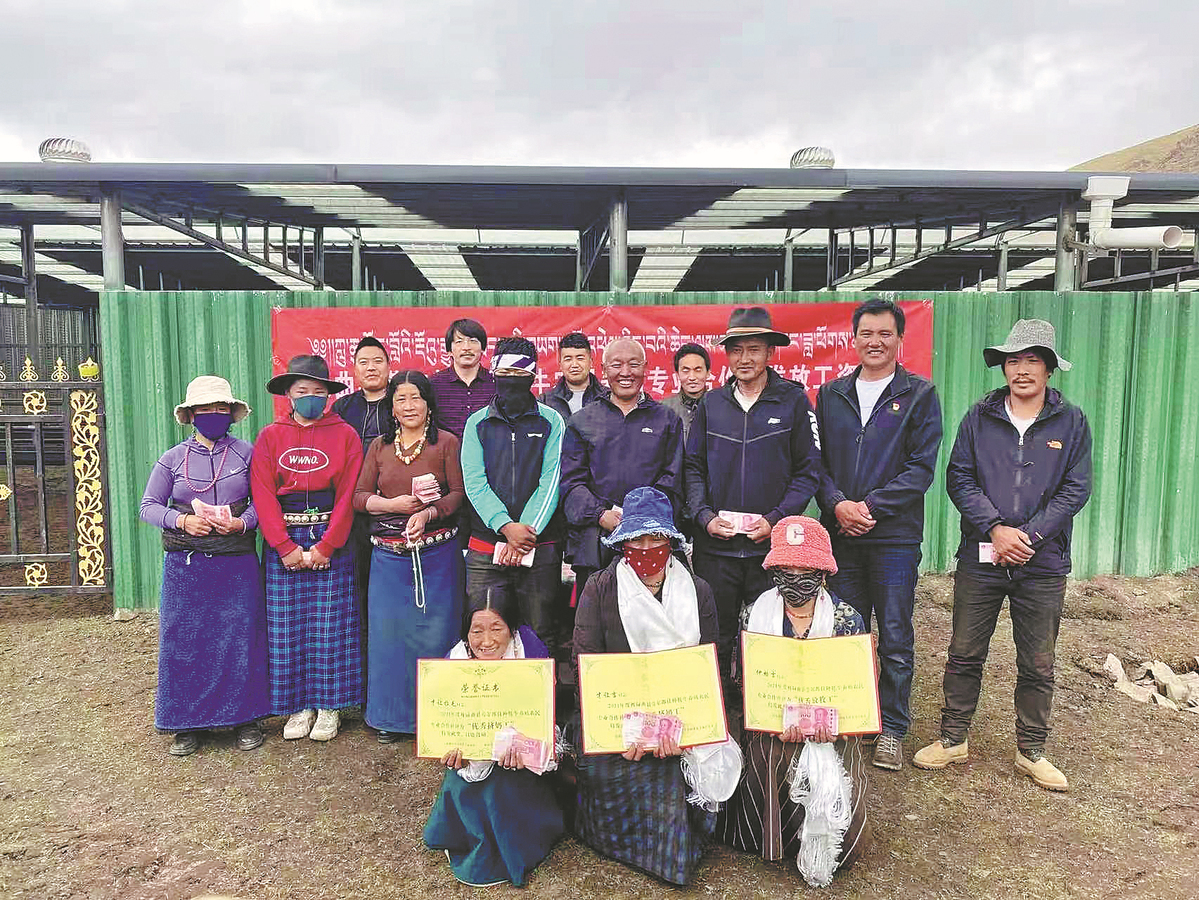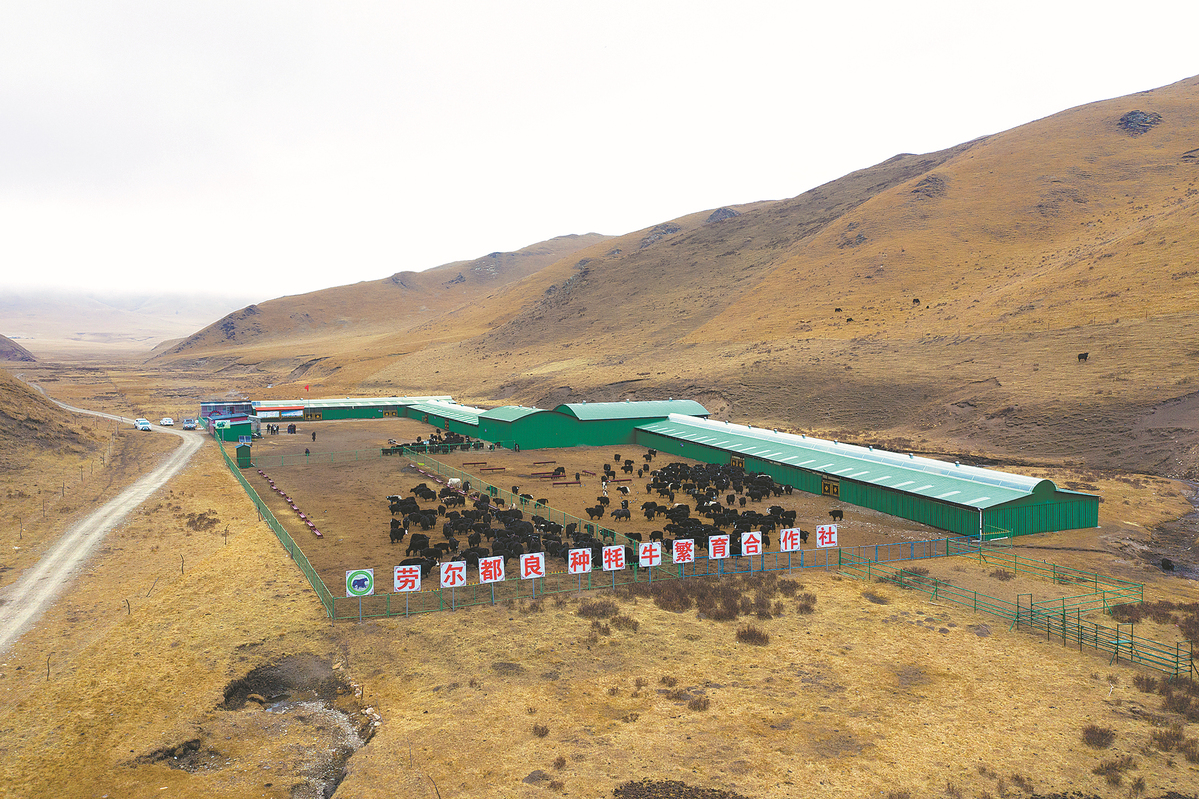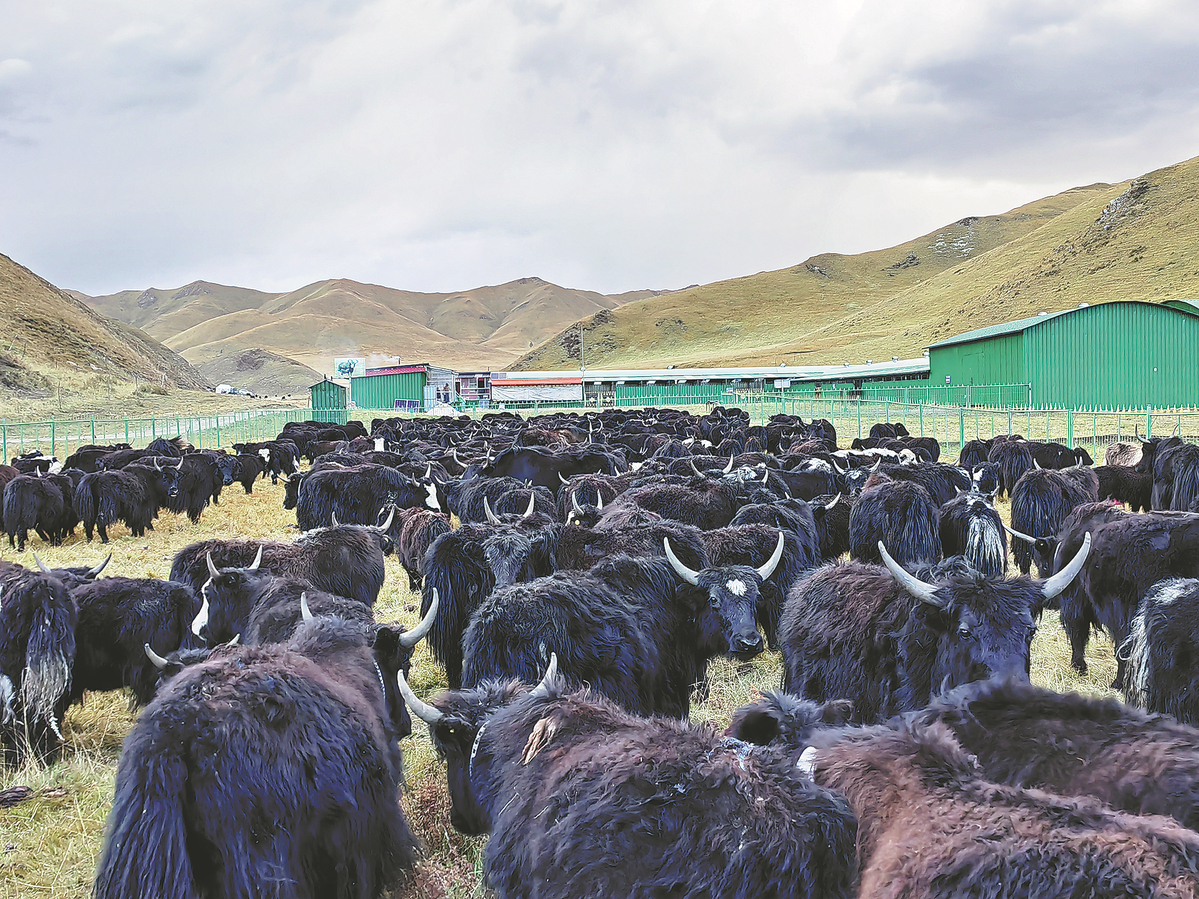
Members of the Lao'erdu Cooperative pose for a group photo in Luqu county, Gansu province. CHINA DAILY
The cluster development of cooperatives is expected to be further promoted in Gansu after the province's Lao'erdu Cooperative model in Luqu county was selected as one of 12 successful models worldwide.
Gongbao Lezhi, director of Lao'erdu Cooperative, said the model, which focuses on transforming single household farms into a unified effort, is of great significance to farmers and herdsmen in Luqu.
"Previously, there had never been such a model in Luqu county and Gannan prefecture, and farmers and herdsmen were not familiar with it, nor did they recognize or trust it," Gongbao said.
"But with support from the local government, as well as the exemplary role Lao'erdu Cooperative has played, every village and township in the county now recognizes that the cluster development model can help them achieve common prosperity in the years to come."
 A yak farm is run by the cooperative in a pastoral area in Luqu. CHINA DAILY
A yak farm is run by the cooperative in a pastoral area in Luqu. CHINA DAILY
Gongbao said the model works because members in the cooperative can share their experiences, which they can take advantage of to realize economic benefits. Furthermore, it helps maintain stability and promotes ethnic unity.
"There used to be conflicts and a lack of unity among neighbors in grassland management. But now, with reasonable management and equal distribution, all conflicts have been resolved," he said.
The Lao'erdu Cooperative case, with the title "From a Household Initiative to a Cooperative Model: Empowering Tibetan Families in China", was selected as one of the 12 successful cases worldwide during the United Nations Food and Agriculture Organization Global Conference on Sustainable Livestock Transformation, which was held in Italy in September.
The core of the case is to maximize the integration efficiency of grassland, livestock and labor resources in cooperatives through technological empowerment, with the support of governments at all levels.
It fully embodies the four aspirations of the FAO — better production, better nutrition, better environment and better life.
During the conference, the Lao'erdu case was invited to be presented for three days at the FAO headquarters in Rome, demonstrating the remarkable development achievements China has made in its high-altitude pastoral areas over the years.
The case, aiming to promote the transformation and implementation of scientific research achievements and assist in the vitalization of pastoral areas and rural areas, was jointly implemented and promoted by Long Ruijun, deputy director of the expert group on the Transformation of Grassland Animal Husbandry Development Model and High Quality Development Technology initiative in Gannan prefecture, and his team and related government departments.
Long, an internationally renowned yak expert and professor at Lanzhou University, and his team have been persistently engaged in basic and applied research as well as practical promotion work on the frontlines of grassland pastoral areas on Asian plateaus.
Long has also been paying a great deal of attention to community life and social development in the high-altitude pastoral areas.
Working with the Lao'erdu Cooperative, Long and his team have provided long-term scientific guidance and targeted research for the project's planning, production, breeding, management, operation, sales, and emission reductions.
Gongbao, the Lao'erdu cooperative's director, said that before joining cooperatives, many households had to develop on their own but lacked experience.
 Yaks are the main source of income for herders in the county. CHINA DAILY
Yaks are the main source of income for herders in the county. CHINA DAILY
"Since local households have clustered for development, our production has expanded and profits have increased as more modern technologies have been introduced," he said.
"With a focus on breeding and a combination of traditional and modern methods ... the breeding ability of yaks has been improved, the variety of yaks has increased, and profits from raising yaks have grown, thus increasing farmers' incomes."
According to Gongbao, households that raised about 100 yaks each used to earn annual incomes of between 50,000 and 60,000 yuan in the past. Now, they earn about 120,000 yuan ($16,894) per year on average.
With the support of local governments and experts — particularly Long and his team, who have provided farmers and herdsmen with great technical guidance — cooperatives in the area have made rapid progress in ecological protection and scientific grass storage, he said.
"Local households are now able to make reasonable use of grasslands and scientifically raise yaks, which gives them more confidence in the future development of the animal husbandry industry," he said.
Gongbao said his cooperative would spare no effort to develop more sales stores for agricultural and livestock products to increase their market presence in the years to come.
A large-scale slaughtering and processing base is now being constructed in Luqu to carry out processing and cold-chain transportation.
"And we will use online and other means to further promote our green and dairy products in the plateau region to other parts of the country, achieving complete and large-scale development," he said.
"We will further expand the scale of cooperatives, broaden income channels and lead the local people to increase their incomes and become rich in the months ahead."
Gannan prefecture, which sits at a high altitude, is suitable for developing the animal husbandry industry, he added.
来源:中国日报



